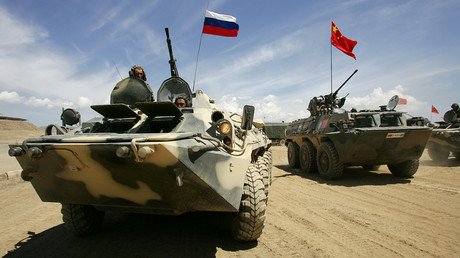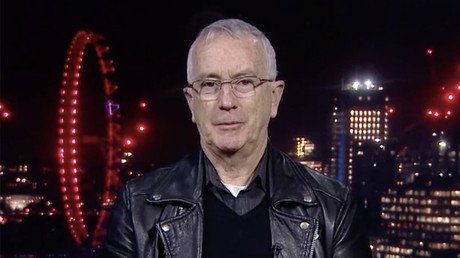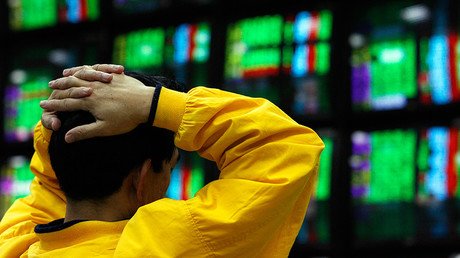Western Media's conundrum – why is 'bad guy' Putin so popular at home?
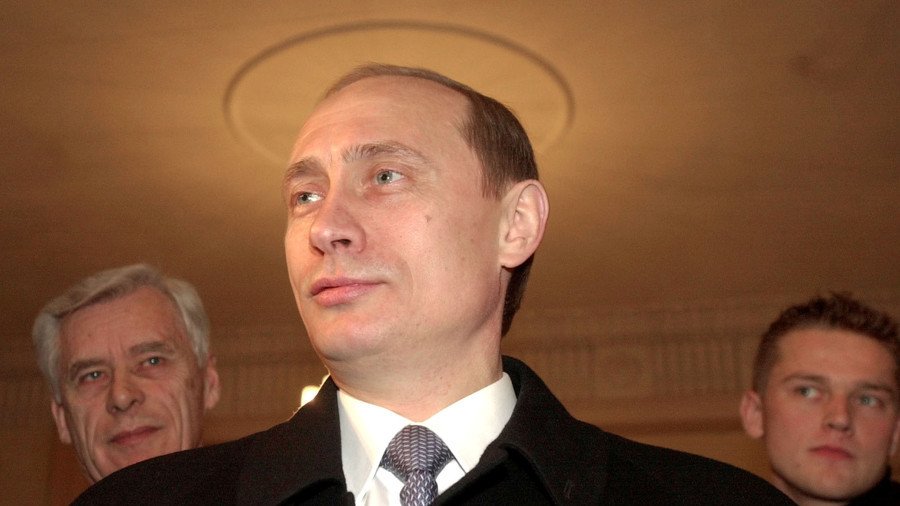
Russian President Vladimir Putin is reviled as a "bad person" in the Western press and by Western politicians. And those accusations have heightened since the Skripal poisoning incident, which has been blamed on the Kremlin.
I'm neither going to dispute, nor support that characterization. Instead, I want to give some background as to why a "bad person" or "strongman" or, indeed, a hyper patriot, might have been elected Russia's leader in the first place. In other words, I want to explain why Putin has pursued certain policies which have helped to prompt such emotional reactions from many Western analysts.
And elected he was, first in 2000 – when, though the elections were criticized, they were regarded as broadly democratic. He has since been elected another three times, though Russia is no longer regarded as a true democracy by much of the West's media and political establishments.
The Bolshevik Experiment
No story starts yesterday, especially with Russia. The latest date one should commence with is 1914, when Russia was ruled by a hereditary emperor whose political ineptness helped lead to the First World War. The many disasters that flowed from WWI led to Nicholas II's own overthrow in 1917 when, after a bloody civil war, the Bolshevik faction of the Communist Party led by Vladimir Lenin became Russia's new leaders.
The communist movement, and its ambition for a different form of social organization to capitalism, was borne of the harsh conditions of the early period of industrialization in the West: the phrase "dark Satanic mills" was coined not by Marx, but by the poet William Blake, fourteen years before Marx was born. But Marx gave birth to the most compelling critique of capitalism, as well as, in his typical fashion, an argument that it was nonetheless a necessary stage in human history. His call to arms, The Communist Manifesto (co-authored with the industrialist Engels and published in 1848), was as much a paean to capitalism as a critique of it.
Capitalism, Marx and Engels observed, had transformed both the means of production, and the social structure of society. It had replaced handicrafts with the coal-fire-powered factory system (those "dark, Satanic mills"). It traded the complicated stratification of feudal society with, they asserted, just two great opposing social classes: workers and capitalists.
Both transformations, Marx believed, were necessary precursors to a better society, and capitalism was their crucible.
In contrast, Lenin's Bolsheviks believed – partly as a side effect of the accidents of history that gave them power in the first place – that Russia could leapfrog the capitalist stage of history and bring about "socialism in one country" via a process of rapid industrialization.
For this they needed a plan, and its essence was provided by the engineer Grigory Feldman. Working from Marx's division of industry into one part that produced the "Means of Production" and another that used these machines to produce consumer goods, Feldman argued that "promoting the means of production over the means of consumption" would give backward but socialist Russia a huge advantage over the advanced capitalist West.
Initially, consumer goods production would be low, and grow more slowly than investment goods output, so that the population would suffer from low levels of consumption. But as the means of production expanded far faster in the Soviet Union than the West, the time would come when the material prosperity of the workers under socialism in the USSR would far surpass that of their counterparts under capitalism.
Future party bosses Josef Stalin and Nikita Khrushchev believed these simulations. They were the basis of Khrushchev's famous claim in 1956 that "we will bury you." He meant that the material success of socialism would lead the relatively impoverished working class of the West to demand socialism for themselves. The success of socialism in one country, Stalin & Khrushchev believed, would lead to socialism in all.
This material challenge, of course, failed to materialize, and there were two predominant reasons for it, one very simple and the other rather more subtle.
The simple reason was that Feldman's mathematics assumed a limitless supply of peasants who could become industrial workers. Replacing low productivity fields with the high productivity factories would cause output to grow very rapidly.
While this assumption held true, Soviet growth did indeed outstrip the West, and no more so than in the period of Post-WWII reconstruction.
But once all those peasants were fully employed as industrial workers, the rapid growth in the means of production stopped. Worse still, Soviet planners continued to prioritize machinery output over consumption goods, causing per capita consumption to go backwards. The outcome was queueing: sure, you could buy a TV, or a refrigerator, but it would arrive years after you made your down-payment.
The workers' response to this was well captured in the Soviet quip that "they pretend to pay us, and we pretend to work." While monetary wages were reasonable, the fact that you couldn't buy anything with that money meant that the pay was often effectively worthless. Growth in production, already lackluster, slowed even more.
Quality improvement stalled as well, because the Soviet system lacked the essential stimuli to innovation. As the brilliant Hungarian economist Janos Kornai put it, Soviet production was "resource constrained." With all workers fully employed (if faking work rather than actually doing it), and all factories required to produce to capacity, the easiest way to come within reach of the ever-rising (and ever-unmet) output targets of the Five Year Plan was to produce more of last year's model.
I saw a vivid illustration of this in far-away Australia in 1975, when my then-girlfriend's brother decided to get a 650cc motorcycle on the cheap by buying a Soviet Cossack motorbike for A$650, rather than a rival Japanese motorbike for around A$3,000. Once we unpacked it from its wooden crate, what stood before us, in all its antique glory, was a 1942 BMW.
Capitalism, by contrast, was, in Kornai's terms, "demand constrained." With numerous companies competing for limited demand in most markets, and all having substantial excess capacity, the best way to capture that demand was to innovate. The 1975 Honda motorcycle was far more desirable than its 1946 ancestor.
So capitalist industry progressed, interrupted by financial crises, but still producing more and better goods all the while. In the end, it was not the workers under capitalism who envied those of socialism, but those trapped behind the Iron Curtain who envied their Western brethren.
This material failure, and the resource-sapping pressure to militarily match the aggressive advanced weapons program of the US, set the grounds for the collapse of the Soviet Union.
These factors also gave rise to a social class that neither Marx nor Engels anticipated: the Russian mafia. With factory bosses under pressure to reach impossible targets, and all factories facing shortages of inputs, the best way to ensure that your factory at least came close to its target was to buy inputs that "fell off the back" of the proverbial truck. Thus, access to consumer goods was possible through a black market as well. A network of criminal suppliers and retailers thus became an essential lubricant for the creaky wheels of Soviet industry. When the wheels fell off the Soviet system, the mafia was well placed to take advantage of it, as were many of the factory bosses with whom they corruptly but effectively worked.
And the wheels did indeed fall off the socialist truck. Gorbachev's attempt at reform via Perestroika was too little too late, and resented and undermined by the old apparatchiks anyway, to the level of a failed coup. The growing social unrest exceeded the capacity of the weakened repressive elements of the regime to contain it.
So, rather than the capitalist world's working class demanding socialism, as Khrushchev dreamed, the working class of the Bolshevik experiment demanded capitalism.
Unfortunately, what they got was capitalism with a double whammy of American ideology.
The Overnight Transition to Capitalism
American economists saw the collapse of the Soviet system as vindication, not just of the market over central planning – which was a valid interpretation of history – but also of their own theory of capitalism. This portrayed the main strength of the market as its ability to rapidly reach equilibrium. Fantastically, they believed that simply by removing price controls, Russia could transit from stagnant socialism to harmonious capitalism virtually overnight. This statement from Murray Wolfson is typical of the glib ideological stupidity proffered as advice by American economic advisers: "Central planners seemingly should at once resign their posts and close their offices. Their departure simply would signal the market to move immediately to equilibrium." (Wolfson 1992, p. 37)
What market? The whole point of the transition from socialism was to create a market economy, not to watch an already-existing one jump "immediately to equilibrium." But that little detail seemed to escape American economists, who recommended a rapid 'shock therapy' transformation of the many once-socialist economies to market systems. Worries that this might fail were dismissed with glib jokes.
Unfortunately, naïve mainstream economists weren't the only ones pushing for a rapid transition. So too were America's political operators, who saw it, not as an opportunity to transform Russia into a market economy, but as a means to destroy a rival superpower. If shock therapy killed the patient, great: where military force had been ineffective, economics could instead cripple America's greatest rival.
Jeffrey Sachs, an architect of 'shock therapy' policies in Bolivia and Poland who supported a rapid transition, saw the malicious nature of US policy towards Russia, and found himself powerless to stop it, as he explained in a Twitter exchange with me last year.

He still argues that a rapid transition could have worked, but says that by "rapid" he meant over "5-10 years, with rules and law." Instead, Russia's transition was first planned to take 500 days, and was finally executed in less than 150 lawless days.
The result was economic collapse, political chaos, and the morphing of the mafia (and many ex-Communists) into the Oligarchs, who took possession of many of the once state-owned enterprises, and much of Russia's publicly owned resources, during the so-called privatization process.
For some Russians, the result of the transition was death. This was brought home to me viscerally when I spoke at the Russian University of Humanities in 2011. As we discussed our respective economics departments, my Russian counterpart remarked that his department had more academics before the transition. I asked what happened to the ones who had left. He gave me a querulous look and responded: “They died.” He explained that the deregulation of prices began on January 2, 1992, when many Russians were still recovering from their New Year’s hangovers. They woke to find that prices had quadrupled, while for most, their incomes remained the same.
The destructive impact of the far-too-rapid transition was an increase in the mortality rate, which medical researchers concluded meant that "an extra 2.5-3 million Russian adults died in middle age in the period 1992-2001 than would have been expected based on 1991 mortality. "
In strict economic terms, the transition was an abject failure – that is, if you think it was intended to improve Russian living standards. GDP virtually halved between 1990 and 1998, living standards plummeted, crime proliferated, and Russian society almost collapsed. Even today, output is barely above pre-transition levels.
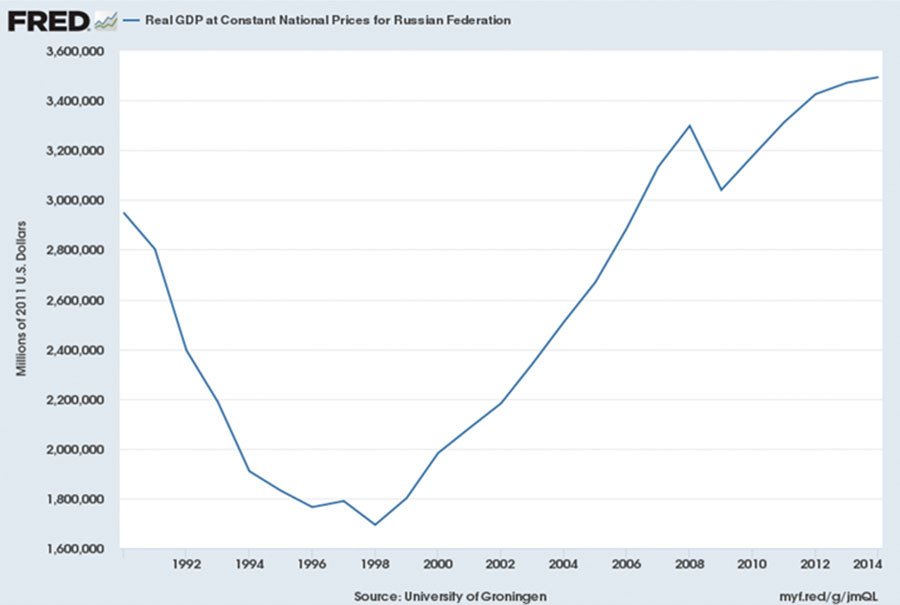
The failure of the rapid transition policies forced on Russia by the US is even more apparent when Russia’s transition performance is compared with China’s, where the communists remained firmly in control, and where the transition was deliberately undertaken at a measured pace. Russia’s per capita GDP today is only slightly above its level at the end of the Soviet period. China’s per capita GDP is ten times what it was in 1990.
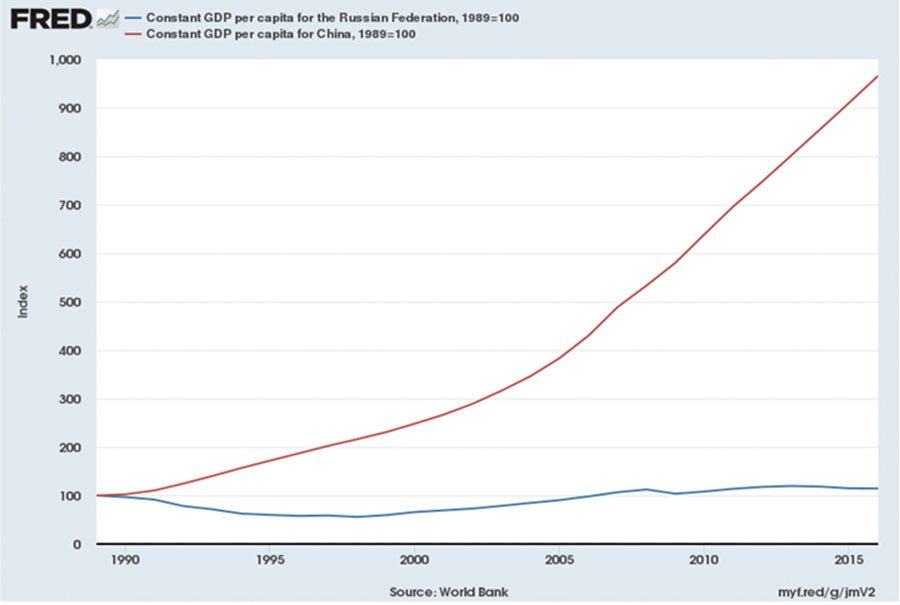
The Strongman-led Recovery
However, viewed from the very bottom of this brutal process in 1998, Russia has made remarkable progress: from 1998 until now, GDP has more than doubled, in both total and per capita terms.
For almost all of this time, Russia’s president or prime minister has been Vladimir Putin.
Prior to his election in 2000, Putin rose to prominence in part because of his successful repression of the Chechen revolt. This hardly endeared Putin to the Chechens. But it gave him the aura of a strongman at the time most Russians believed their country desperately needed one, to eliminate the low-level mafia who tormented the public directly, to subdue the Oligarchs who exploited them, and to stand up to the West when his predecessor Yeltsin had effectively been a puppet.
Putin can’t be solely credited with starting the economic turnaround, but his strongman approach to running Russia was welcomed, and is still welcomed, by the majority of his countrymen.
Russia is far from perfect under Putin, and Putin is far from perfect himself. But its economy and its national pride have been restored under his rule, and the Russian public cannot be faulted for feeling substantial antipathy towards the West, and the US in particular.
Given that Russia has legitimate grievances about how the West treated it after it decided to join the capitalist camp, and the disastrous outcomes of all previous Western attempts at regime change, I’d rather our so-called leaders aimed for rapprochement with Russia, and yes, with Putin, instead of heightened animosity.
The statements, views and opinions expressed in this column are solely those of the author and do not necessarily represent those of RT.



